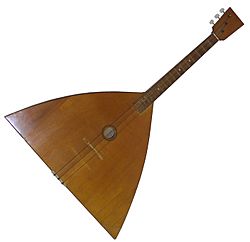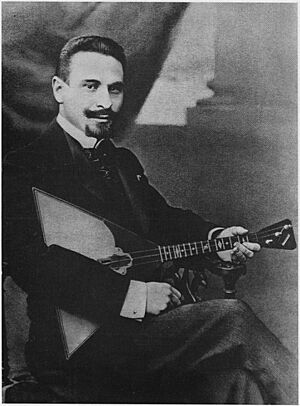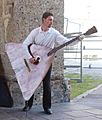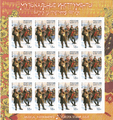Balalaika facts for kids

A tenor balalaika
|
|
| String instrument | |
|---|---|
| Hornbostel–Sachs classification | 321.321 (Necked bowl lute) |
The balalaika is a cool musical instrument that comes from Russia. It's part of a family of instruments, just like how guitars come in different sizes. The balalaika family includes the piccolo balalaika, prima balalaika, sekunda balalaika, alto balalaika, bass balalaika and contrabass balalaika.
All balalaikas have three strings. They can be tuned in different ways, but the most common way is to tune them to the notes E-E-A. The smaller ones, like the prima balalaika, are usually played by plucking the strings with your fingers. The sekunda and alto balalaikas can be played with fingers or a pick, depending on the song. The really big ones, like the bass and contrabass balalaikas, have legs that rest on the floor. Players use leather picks to play these larger instruments.
Long ago, pictures of the balalaika show it had anywhere from two to six strings. This was similar to some instruments found in Central Asia. The frets on older balalaikas were made from animal gut. They were tied to the neck, which meant players could move them around.
How the Balalaika Got Better
A Russian man named Vasily Vasil'yevich Andreev made the balalaika much better. He heard peasants on his farm playing instruments that weren't made very well. Andreev wanted to improve the balalaika. He dreamed of using it for concerts.
He spent the rest of his life working on this instrument. Two violin makers and a carpenter helped him. They made the soundboard better, which made the instrument much louder. Andreev also came up with the idea for the different sizes: prima, sekunda, alto, bass, and contrabass balalaikas.
After that, he spent several years writing and arranging music. This music was for groups of balalaikas to play together. The very first public concert by the Ensemble of Balalaika Players happened in 1888.
Later, after a big change in Russia's government, people were encouraged to play the balalaika. This led to the creation of large balalaika orchestras.
Images for kids
-
Balalaika model of 1980 made for the 1980 Summer Olympics in Moscow
See also
 In Spanish: Balalaica para niños
In Spanish: Balalaica para niños
 | Janet Taylor Pickett |
 | Synthia Saint James |
 | Howardena Pindell |
 | Faith Ringgold |









